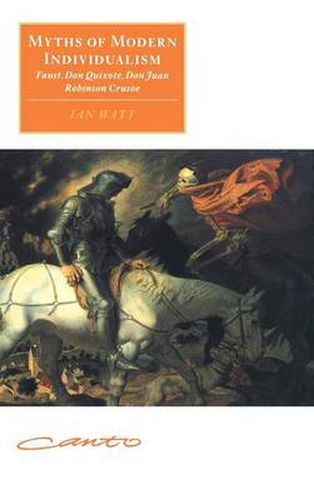Readings Newsletter
Become a Readings Member to make your shopping experience even easier.
Sign in or sign up for free!
You’re not far away from qualifying for FREE standard shipping within Australia
You’ve qualified for FREE standard shipping within Australia
The cart is loading…






In Myths of Modern Individualism, the renowned critic Ian Watt treats Don Juan, Don Quixote, Faust, and Robinson Crusoe as individualists, pursuing their own views of what they should be. The original Counter Reformation myths saw the individualism of Don Juan, Don Quixote, and Faust as a problem to be quelled by death or mockery. However, the Romantic period, a time more favorably disposed toward myth, saw their dissension not as unacceptable disorder, but rather as admirable and heroic behavior. This incisive study traces attitudes toward these figures and the Romantic product Robinson Crusoe from disapproval to awe to skepticism, examining them as icons of such problems as solitude, narcissism, and the claims of the self versus the claims of the community. Pointedly, none of these figures marries or has a lasting relationship, save for the selfless devotion of a single male servant. Watt argues that the myths of Don Juan, Don Quixote, Faust, and Robinson Crusoe remain the distinctive products of Western society, embodying the most basic values of modern culture.
$9.00 standard shipping within Australia
FREE standard shipping within Australia for orders over $100.00
Express & International shipping calculated at checkout
In Myths of Modern Individualism, the renowned critic Ian Watt treats Don Juan, Don Quixote, Faust, and Robinson Crusoe as individualists, pursuing their own views of what they should be. The original Counter Reformation myths saw the individualism of Don Juan, Don Quixote, and Faust as a problem to be quelled by death or mockery. However, the Romantic period, a time more favorably disposed toward myth, saw their dissension not as unacceptable disorder, but rather as admirable and heroic behavior. This incisive study traces attitudes toward these figures and the Romantic product Robinson Crusoe from disapproval to awe to skepticism, examining them as icons of such problems as solitude, narcissism, and the claims of the self versus the claims of the community. Pointedly, none of these figures marries or has a lasting relationship, save for the selfless devotion of a single male servant. Watt argues that the myths of Don Juan, Don Quixote, Faust, and Robinson Crusoe remain the distinctive products of Western society, embodying the most basic values of modern culture.